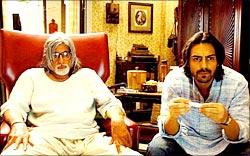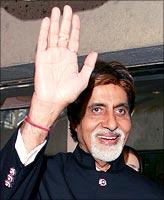There are two things that can happen as you watch The Last Lear, the kind of film Amitabh Bachchan says he has been waiting for a very long to work on.
You could come dazzled watching his performance as an eccentric and often cantankerous retired Shakespearean stage actor, wondering why he had not played a similar before. Or, you may like his work but wonder if he had not overdone while reciting soliloquies from Henry V, The Tempest, King Lear and Hamlet.
Amitabh Bachchan may be expecting the latter reaction.
"I have deliberately gone over the top while reciting Shakespeare in the film," Bachchan said last week after the English language film premiered at the recently-concluded Toronto International Film Festival.
The recital scenes take place many years after the actor has retired from the stage, and he has a visitor -- a young movie director (Arjun Rampal) who wants to cast him in a film for the first time ever.
"I thought, what if the man (Harish Mishra, who calls himself Harry) wants to impress this young director and he is overdoing his stuff?" Bachchan wondered with a wry smile. "Perhaps Harry was not a very good actor, to begin with. And also, what if after a few years he had really forgotten the craft?"
Bachchan, who plays an actor for the first time in his career, was in a good mood on the day of the interview. The previous day The Last Lear had received a huge ovation from over 1,200 people, mostly Indians, at the red carpet premiere. The Toronto dailies did not carry a review of the film, though but Screen International praised Amitabh Bachchan considerably.
'The larger-than-life role of a mercurial stage giant... fits Bachchan like a glove,' the influential trade publication wrote. 'Had the script devoted more time to him and less to the emotional problems of here women (Preity Zinta, Shefal Shah and Divya Dutta), the entire film would have gained coherence.'
The more influential trade publication, Variety, wrote that the film was 'partially made to honour superstar Amitabh Bachchan -- incredible in his first primarily English-lingo pic.'
 But Ghosh's handling 'is stodgy and dull and calls out for trimming,' the review added. 'Local audiences and non-resident Indian fans will flock to see this unusual Bachchan project and will patiently look past work's myriad problems.'
But Ghosh's handling 'is stodgy and dull and calls out for trimming,' the review added. 'Local audiences and non-resident Indian fans will flock to see this unusual Bachchan project and will patiently look past work's myriad problems.'
The Toronto Star ran an interview with Bachchan making it the lead in the arts section.
"I'm just happy with the fact that I was able to do something different," he said. "So far, my career has been very commercial escapist cinema. In my younger years, I was only playing romantic leads but it limits you. You have to be good-looking, have an interest in a good-looking girl, convince her father to let you marry her and beat the baddies, but that's about it. As you grow older, there's more variety in the roles that are offered and definitely, it becomes more challenging. I can only be grateful to the directors in India who at this stage, of my career still come up with challenging roles for me."
The film, directed by Rituparno Ghosh and featuring Zinta as an actress who's jealous and insecure husband makes her life hell, and Arjun Rampal as a temperamental film director, will be released in India in December. But it will go to a number of film festivals in America, the United Kingdom and Italy before landing in the multiplexes in India.
It is not just that Bachchan is in an English language film that makes The Last Lear a curiosity factor but also how he looks. You see him in flowing grey tresses and spectacles. You will also see him often in a foul mood. But there are some really funny scenes too. For instance, the one in which Siddharth (Rampal) and Harry keep an eye on men urinating on the compound's wall. You will also see him in an emotional sequence when he goes down on his knees begging Siddharth to let him do a scene without using a double or a stuntman.
Though the film is in English, Bachchan, who is fully drunk in the scene, switches on for a few minutes to Bengali.
"I have noticed over the years that some of us can pick up different English accents when we are in different companies," he says chuckling. "If we are with an Englishman, we try to switch on to that accent, for example. But when we are drunk, we speak the language that gives us comfort or has a special connection," says Bachchan.
 "My character in the film is called Mishra but he has lived in Kolkata for a long time," Bachchan continues. "So in a very crucial and vulnerable moment, he speaks in Bengali."
"My character in the film is called Mishra but he has lived in Kolkata for a long time," Bachchan continues. "So in a very crucial and vulnerable moment, he speaks in Bengali."
His co-stars have praised him for encouraging them to speak their lines in English without worrying too much about the accent. But Bachchan admits he was nervous about carrying out the dialogue in English throughout the film.
"I know there is no one way to recite Shakespeare," he says. "Actors from Laurence Olivier to Richard Burton to Ian McKellen have made Shakespeare their own. I did not want to anyone. I was doing more than reciting a few lines of Shakespeare for the entire film is English. I lost sleep; there were butterflies in my stomach. And that is how it should be. If I were relaxed, I would be doing dishonest to my profession."
Working in the film as a Shakespearean actor sent him down the memory lane. He said he was grateful to Ghosh, who had adapted the Utpal Dutt play Aajker Shahjahan and for making the actor in the film a Shakespearean actor.
"I grew up admiring Shakespeare," Ghosh says. "And when I began working on the script, I could think only of Bachchan. It did not even occur to me he might say, 'no.'
"In school, like many people I had come to appreciate Shakespeare deeply but I also felt he was a pain in the ass," he continues, smiling broadly. "My association with Shakespeare is not confined to my schooling in the English medium schools. Babuji (father Harivansh Bachchan) translated four of Shakespeare's tragedies including King Lear. So on many levels, working on this film was a precious experience."
In one of the crucial sequences in the film, Harry teaches a diffident Shabanam (Zinta) to let herself go without over acting. He tutors her to use her lung power to let her voice soar across a valley but without sounding like she was yelling.
"I had read Richard Burton used to do that to improve his voice," Bachchan says. Many of the crucial scenes in the film, Ghosh says, resulted from having a continual discussion with Bachchan much before the shooting started.
Some people may think The Last Lear is a risky film for him. Haven't some of his more offbeat films including Saudagar in which he was paired with Nutan and Do Anjane had small runs?
"You take up a film because you are intrigued by the story and the script," he said with waning smile. "You also feel that the project challenges to give an interesting performance. Some times such films don't do well. We can never really predict what becomes a hit and what flops. In the case of a good film that had a short run, one can get some satisfaction if it wins an award or two or reaches out to millions when it is telecast."
He spent over a month shooting for the film in Kolkata where he had started working for shipping company before heading to Mumbai to look for acting jobs in the 1960s.
"It was like a grand homecoming for Mr Bachchan," says Ghosh, adding with a hearty laughter that Bachchan's presence in the city created near chaos as thousands of fans tried to get a glimpse of him.
"I love Kolkata deeply and the city itself is one of the characters in the film," Ghosh says. "And it was important for me that Harry was played by someone who is familiar with the city. Bachchan is more than familiar with it. He has lived and worked here, and he has returned to Kolkata quite often.
"For the people in the city, it felt like their favourite jamaai (son-in-law) was coming home," Ghosh adds. "They know his wife Jaya is from Kolkata."






 © 2025
© 2025